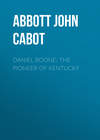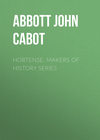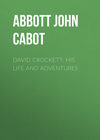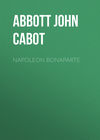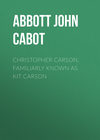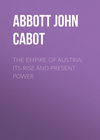Kitabı oku: «Benjamin Franklin»
PREFACE
Next to George Washington, we must write, upon the Catalogue of American Patriots, the name of Benjamin Franklin. He had so many virtues that there is no need of exaggerating them; so few imperfections that they need not be concealed. The writer has endeavored to give a perfectly accurate view of his character, and of that great struggle, in which he took so conspicuous a part, which secured the Independence of the United States. Probably there can no where be found, within the same limits, so vivid a picture of Life in America, one hundred years ago, as the career of Franklin presents.
This volume is the twelfth of the Library Series of Pioneers and Patriots. The series presents a graphic history of our country from its discovery.
1. Christopher Columbus reveals to us the West Indies, and gives a narrative of wonders unsurpassed in fact or fable.
2. De Soto conducts us to Florida, and leads us through scenes of romance, crime, blood and woe – through many Indian tribes, across the continent, to the Mississippi, where he finds his melancholy grave.
3. La Salle, and his heroic companions, traversed thousands of miles of majestic lakes and unknown rivers, and introduces us to innumerable barbaric tribes. There is no other writer, who, from his own personal observation, can give one so vivid an idea of Life in the Indian village and wigwam.
4. Miles Standish was the Captain of the Pilgrims. He conducts us in the May Flower, across the Atlantic, lands us at Plymouth, and tells the never to be forgotten story of the heroism of our fathers in laying the foundations of this great republic.
5. Captain Kidd, and the Buccaneers, reveal to us the awful condition of North and South America, when there was no protecting law here, and when pirates swept sea and land, inflicting atrocities, the narrative of which causes the ear which hears it to tingle.
6. Peter Stuyvesant takes us by the hand, and introduces us to the Dutch settlement at the mouth of the Hudson, conveys us, in his schooner, up the solitary river, along whose forest-covered banks Indian villages were scattered; and reveals to us all the struggles, by which the Dutch New Amsterdam was converted into the English New York.
7. Benjamin Franklin should chronologically take his place here. There is probably not, in the compass of all literature, a biography more full of entertainment and valuable thought, than a truthful sketch of the career of Benjamin Franklin. He leads us to Philadelphia, one hundred and fifty years ago, and makes us perfectly familiar with life there and then. He conducts us across the Atlantic to the Court of St. James, and the Court of Versailles. There is no writer, French or English, who has given such vivid sketches of the scenes which were witnessed there, as came from the pen of Benjamin Franklin. For half a century Franklin moved amid the most stupendous events, a graphic history of which his pen has recorded.
8. George Washington has no superior. Humanity is proud of his name. He seems to have approached as near perfection as any man who ever lived. In his wonderful career we became familiar with all the struggles of the American Revolution. With a feeble soldiery, collected from a population of less than three millions of people, he baffled all the efforts of the fleets and armies of Great Britain, the most powerful empire upon this globe.
9. Daniel Boone was the Cowper of the wilderness; a solitary man loving the silent companionship of the woods. He leads us across the Alleghanies to the fields of Kentucky, before any white man’s foot had traversed those magnificent realms. No tale of romance could ever surpass his adventures with the Indians.
10. Kit Carson was the child of the wilderness. He was by nature a gentleman, and one of the most lovable of men. His weird-like life passed rapidly away, before the introduction of railroads and steamboats. His strange, heroic adventures are ever read with astonishment, and they invariably secure for him the respect and affection of all who become familiar with his name.
11. Paul Jones was one of the purest patriots, and perhaps the most heroic naval hero, to whom any country has given birth. He has been so traduced, by the Tory press of Great Britain, that even the Americans have not yet done him full justice. This narrative of his astonishing achievements will, it is hoped, give him rank, in the opinion of every reader, with Washington, Franklin, Jefferson and Lafayette.
12. David Crockett was a unique man. There is no one like him. Under no institutions but ours could such a character be formed. From a log hut, more comfortless than the wigwam of the savage, and without being able either to read or write, he enters legislative halls, takes his seat in Congress, and makes the tour of our great cities, attracting crowds to hear him speak. His life is a wild romance of undoubted truth.
Such is the character of this little library of twelve volumes. The writer, who has now entered the evening of life, affectionately commends them to the young men of America, upon whose footsteps their morning sun is now rising. The life of each one, if prolonged to three score years and ten, will surely prove a stormy scene. But it may end in a serene and tranquil evening, ushering in the glories of an immortal day.
John S. C. Abbott.Fair Haven, Conn.
As this is not improbably the last book I shall write, it may not be improper for me to state that, at the age of twenty-four, I commenced the career of an author, by writing “The Mother At Home.” I have now attained the age of three score years and ten. In the meantime I have written fifty-four volumes of History or Biography. In every one it has been my endeavor to make the inhabitants of this sad world more brotherly, – better and happier.
The long series is probably closed with the biography of Benjamin Franklin. Every page has been penned under this impression. A theme more full of instruction and interest could not be chosen.
And now, in my declining years, as I feel that the battle has been fought and, I hope, the victory won, it is an unspeakable comfort for me to reflect, that, in all these fifty-four volumes, there is not one line which, “dying, I could wish to blot.”
CHAPTER I.
Parentage and Early Life
The parentage of Franklin – His parents emigrate to America – Character of his father – Abiah Folger, his mother – Birth and baptism – Influence of his Uncle Strong – Of the Whistle – Childish exploits – Uncongenial employment – Skill in swimming – Early reading. – Boston at that time – An indentured apprentice – Form of Indenture – Enters a printing office – Fondness for reading – Anecdotes – Habits of study – Fondness for argument – Adopts a vegetable diet – The two creeds
About the year 1685, Josiah Franklin, with his wife and three children, emigrated from Banbury, England, to seek his fortune in this new world. He was in all respects a very worthy man, intelligent, industrious, and influenced to conduct by high moral and religious principles. Several of Josiah Franklin’s neighbors accompanied him in his removal.
Boston was then a straggling village, of five or six thousand inhabitants. In front spread out its magnificent bay, with its beautiful islands. In the rear the primeval forest extended, almost unbroken, through unexplored wilds to the Pacific. His trade was that of a dyer. Finding, however, but little employment in that business, he set up as a tallow chandler and soap boiler. Four years of life’s usual joys and sorrows passed away when Mrs. Franklin died, leaving six children. The eldest was but eleven years of age. This motherless little family needed a maternal guardian. Within the year, Mr. Franklin married Abiah Folger, of Nantucket. She was the youngest daughter of Peter Folger, a man illustrious for many virtues, and of whom it has been well said, that “he was worthy to be the grandfather of Benjamin Franklin.” She proved to be a noble woman, and was all that either husband or children could wish for. Ten children were the fruit of this union. Benjamin was born on the sixth of January, (O. S.) 1706.
He was born in the morning of a Sabbath day. His father then resided directly opposite the Old South Church, in Milk street. The same day, the babe, whose renown it was then little imagined would subsequently fill the civilized world, was wrapped in blankets, and carried by his father across the street through the wintry air, to the Old South Church, where he was baptized by the Rev. Dr. Willard. He was named Benjamin, after a much beloved uncle then residing in England. This uncle was a man of some property, of decided literary tastes, and of the simple, fervent piety, which characterized the best people of those days. He took an ever increasing interest in Benjamin. He eventually came over to this country, and exerted a powerful influence in moulding the character of his nephew, whose brilliant intellect he appreciated.
Soon after the birth of Benjamin, his father removed to a humble but comfortable dwelling at the corner of Hanover and Union streets. Here he passed the remainder of his days. When Franklin had attained the age of five years, a terrible conflagration took place, since known as the Great Boston Fire. Just as the cold blasts of winter began to sweep the streets, this great calamity occurred. The whole heart of the thriving little town was laid in ashes. Over a hundred families found themselves in destitution in the streets.
An incident took place when Franklin was about seven years of age, which left so indelible an impression upon his mind, that it cannot be omitted in any faithful record of his life. He gave the following account of the event in his autobiography, written after the lapse of sixty-six years:
“My friends, on a holiday, filled my pockets with coppers. I went directly to a shop where they sold toys for children; and being charmed with the sound of a whistle that I met by the way in the hands of another boy, I voluntarily gave all my money for one. I then came home and went whistling all over the house, much pleased with my whistle, but disturbing all the family. My brothers and sisters and cousins, understanding the bargain I had made, told me that I had given four times as much for it as it was worth; put me in mind what good things I might have bought with the rest of the money; and laughed at me so much for my folly, that I cried with vexation; and the reflection gave me more chagrin than the whistle gave me pleasure.”
This story, as published by Franklin, with his keen practical reflections, has become as a household word in all the families of England and America; and has been translated into nearly all the languages of modern Europe.
From early childhood Franklin was celebrated for his physical beauty, his athletic vigor and his imperturbable good nature. His companions invariably recognized him as their natural leader. He was in no respect what would be called a religious boy, but in many things he had a high sense of honor.
There was a marsh, flooded at high tides, where the boys used to fish for minnows. Much trampling had converted the spot into a quagmire. A man was about to build a house near by, and had carted a large quantity of stones for the cellar. Franklin called the boys together and suggested that they should go in the evening, take those stones, and build a wharf upon which they could stand with dry feet. It was done. And under the skilful engineering of the youthful Franklin, it was quite scientifically done. Complaints and detection followed. Josiah Franklin severely reproved Benjamin for the dishonest act, but it does not appear that the conscience of the precocious boy was much troubled. He argued very forcibly that the utility of the measure proved its necessity.
At the age of eight years, Benjamin entered the Boston Grammar School. His progress was very rapid, and at the close of the year he was at the head of his class. The father had hoped to give his promising boy a liberal education; but his large family and straitened circumstances rendered it necessary for him to abandon the plan. At the age of ten years his school life was completed, and he was taken into his father’s shop to run of errands, and to attend to the details of candle-making, cutting wicks, filling moulds, and waiting upon customers. He could write a good hand, could read fluently, could express himself with ease on paper, but in all arithmetical studies was very backward.
There is scarcely any sport which has such a charm for boys as swimming. Franklin excelled all his companions. It is reported that his skill was wonderful; and that at any time between his twelfth and sixtieth year, he could with ease have swum across the Hellespont. In his earliest years, in all his amusements and employments, his inventive genius was at work in searching out expedients. To facilitate rapidity in swimming he formed two oval pallets, much resembling those used by painters, about ten inches long, and six broad. A hole was cut for the thumb and they were bound fast to the palm of the hand. Sandals of a somewhat similar construction were bound to the soles of the feet. With these appliances Franklin found that he could swim more rapidly, but his wrists soon became greatly fatigued. The sandals also he found of little avail, as in swimming, the propelling stroke is partly given by the inside of the feet and ankles, and not entirely by the soles of the feet.
In the vicinity of Boston there was a pond a mile wide. Franklin made a large paper kite, and when the wind blew strongly across the pond, he raised it, and entering the water and throwing himself upon his back was borne rapidly to the opposite shore. “The motion,” he says, “was exceedingly agreeable.” A boy carried his clothes around. Subsequently he wrote to M. Dubourg,
“I have never since that time practiced this singular mode of swimming; though I think it not impossible to cross in this manner from Dover to Calais. The packet boat, however, is still preferable.”1
The taste for reading of this wonderful boy was insatiable. He had access, comparatively, to few books, but those he devoured with the utmost eagerness. Bunyan’s Pilgrim’s Progress was, so to speak, his first love. Having read and re-read it until his whole spirit was incorporated with its nature, he sold the volume and purchased Burton’s Historical Collections. This consisted of quite a series of anecdotes and adventures, written in an attractive style, and published at a low price. In those early years he read another book which exerted a powerful influence in the formation of his character. When eighty years of age he alludes as follows to this work in a letter to Mr. Samuel Mather, who was son of the author, Cotton Mather,
“When I was a boy I met with a book entitled ‘Essays to do Good,’ which I think was written by your father. It had been so little regarded by a former possessor that several leaves of it were torn out; but the remainder gave me such a turn of thinking, as to have an influence on my conduct through life; for I have always set a greater value on the character of a doer of good, than on any other kind of a reputation; and if I have been, as you seem to think, a useful citizen, the public owe the advantage of it to that book.”2
When Franklin was twelve years of age, the population of Boston had increased to about ten thousand. An incident is recorded of Franklin at this time, which strikingly illustrates the peculiarity of his mental structure and the want of reverence with which he gradually accustomed himself to regard religious things. His father’s habit, in the long graces which preceded each meal, rather wearied the temper of his son. The precocious young skeptic, with characteristic irreverence, ventured to say,
“I think, father, that if you were to say grace over the whole cask, once for all, it would save time.”3
This was the remark of a boy but twelve years of age. Though it does not indicate a very devout spirit, it certainly gives evidence of an intellect of unusual acuteness.
Franklin ever spoke of his boyhood as the very happy period of a remarkably happy life. His peculiar temperament enabled him to be happy under circumstances in which others would have been very miserable. His affections in after years ever yearned toward Boston; he was accustomed to speak of it as “that beloved place.” In one of his letters to John Lathrop he wrote,
“The Boston manner, the turn of phrase, and even tone of voice and accent in pronunciation, all please and seem to revive and refresh me.”
For two years Benjamin continued to assist his father in the business of soap and candle making. He was continually looking for an opportunity to escape the drudgery of that employment and enter upon some more congenial business. Like most adventurous boys, he thought much of the romance of a sea-life. An elder brother had run away, had gone to sea, and for years had not been heard from. Benjamin’s father became very anxious as he witnessed the discontent of his son. This anxiety was increased when an elder brother married, removed to Rhode Island, and set up a soap and candle establishment for himself. This seemed to Benjamin to rivet the chains which bound him at home. Apparently his father could not spare him from the business. Thus he seemed doomed to spend the remainder of his days in employment which proved to him increasingly uncongenial.
The judicious father, apprehensive that his son might be lured secretly to embark for some distant voyage, visited with his son all the varied workshops of Boston, that he might select that trade which to him would seem most desirable. Benjamin examined all these workshops with intensest interest. He selected the employment of a cutler, and entered upon the business for a few days; but at that time a boy who was about to learn a trade was apprenticed to a master. As a premium for learning the business he usually had to pay about one hundred dollars. Then after a series of years, during which he worked for nothing, he was entitled for a time to receive journeyman’s wages. But his father, Josiah Franklin, was unable to settle satisfactorily the terms of indenture, and the cutlery trade was given up.
We have mentioned that Franklin was one of a large family of children. By the two marriages of his father, there were sixteen sons and daughters around the family hearth. One of the sons, James, had been sent to London to learn the trade of a printer. He returned to Boston and set up business on his own account, when Benjamin was eleven years of age. It was decided to bind Benjamin to this business. Reluctantly Benjamin consented to place himself in such subordination to his brother. He was, however, bound to him for a period of nine years, from twelve to twenty-one. During the last year he was to receive a journeyman’s wages. The following extract from this form of indenture of apprenticeship, which was in common use in the reign of George the First, will be read with interest.
“He shall neither buy nor sell without his master’s license. Taverns, inns, or ale-houses he shall not haunt. At cards, dice, tables, or any other unlawful game he shall not play. Matrimony he shall not contract; nor from the service of his said master day nor night absent himself, but in all things, as an honest and faithful apprentice, shall and will demean and behave himself towards his said master and all his, during said term. And the said James Franklin, the master, for and in consideration of the sum of ten pounds of lawful British money to him in hand paid by the said Josiah Franklin, the father, the receipt of which is hereby acknowledged, the said apprentice in the art of a printer which he now useth, shall teach and instruct or cause to be taught and instructed the best way and manner that he can, finding and allowing unto the said apprentice, meat, drink, washing, lodging and all other necessaries during the said term.”
Benjamin devoted himself with great assiduity to learn the trade of a printer. The office in which he worked, stood at the corner of Franklin avenue and Court street. For three years, Franklin was thus employed, apparently never seeking recreation, and never having a moment of leisure save such as he could rescue from sleep or from his meals. There were at that time several bookstores in Boston. The eminent men of that province had brought with them to the New World, literary and scientific tastes of a high order. Even then the axe of the settler had been heard but at a short distance in the primeval forests, which still encircled all the large towns. Bears were not unfrequently shot from Long Wharf, as they swam from island to island, or endeavored to cross the solitary bay. It is said that at that time twenty bears were often shot in a week.
Benjamin Franklin, inspired by his love of reading, cultivated friendly relations with the clerks in the bookstores. From them he borrowed interesting volumes, which he took home in the evening with the utmost care, and having spent most of the night in reading, would return them at an early hour in the morning, before the master of the shop had time to miss them.
Something in the demeanor of Franklin attracted the attention of a merchant in Boston by the name of Matthew Adams. He invited him to his library and loaned him books. The lad’s Uncle Benjamin, in England, who was very fond of composing rhymes which he called poetry, sent many of his effusions to his favorite nephew, and opened quite a brisk correspondence with him. Thus Benjamin soon became a fluent rhymester, and wrote sundry ballads which were sold in the streets and became quite popular. There was a great demand at that time for narratives of the exploits of pirates, the doom of murderers, and wild love adventures. It is said that one of the Boston publishers, in the sale of ballads alone, found a very lucrative business. Benjamin, who found it very easy to write doggerel verse, wrote one ballad called “The Light-house Tragedy.” It was a graphic, and what would be called at the present day, a sensational account of a shipwreck, in which the captain and his two daughters perished. He wrote another which was still more captivating, and which in all its main features was historically true. It was an account of the world-renowned pirate, Edward Teach, usually called Blackbeard. The reader will find a minute narrative of the career of that monster in the volume of this series of Pioneers and Patriots entitled “Captain Kidd; or the early American Buccaneers.” One stanza has descended to us which it is said composed a portion of this ballad, and which is certainly a fair specimen of the popular style then in vogue.
“Come all you jolly sailors
You all so stout and brave,
Come hearken and I’ll tell you,
What happened on the wave.
Oh ’tis of that bloody Blackbeard
I’m going now for to tell
And as how by gallant Maynard
He soon was sent to Hell.
With a down, down, derry down.”
This was indeed wretched stuff, as Franklin afterwards admitted; but it is to be remembered he was then but a boy of fifteen. Having composed the ballad and set in type and printed it, he was then sent to hawk it through the streets. This was certainly a remarkable achievement for a lad of his years. The eagerness with which both of the ballads were seized by the public must have greatly gratified the self-esteem of the young writer.
Addison was a bungler in talk, but every sentence from his pen was elegant. He once said, “I carry no loose change in my pocket, but I can draw for a thousand pounds.” Burke said of Goldsmith, “He writes like an angel, but he talks like poor Poll.” Franklin was by no means a bungler in his speech, but he was not fluent. He hesitated, and was at a loss for words, but whatever he wrote had a wonderful flow of harmony. The right word was always in the right place. Doubtless had he devoted as much attention to the acquirement of conversational ease, as he did to skill in writing, he would have been as successful in the one art as in the other. From early life it was his great ambition to be not merely a fine but a forcible writer. He did not seek splendor of diction, but that perspicuity, that transparency of expression which would convey the thought most directly to the mind.
An odd volume of the Spectator fell in his way. He was charmed with the style. Selecting some interesting incident, he would read it with the closest care; he would then close the book, endeavoring to retain the thought only without regard to the expression. Then with pen, in hand, he would sit down and relate the anecdote or the incident in the most forceful and graphic words his vocabulary would afford. This he would correct and re-correct, minutely attending to the capitals and the punctuation until he had made it in all respects as perfect as it was in his power. He then compared his narrative with that in the Spectator. Of course he usually found many faults which he had committed, but occasionally he could not but admit he had improved upon his original. This encouraged him with the hope that by long continued practice, he might become an able writer of the English language. This practice he continued for months, varying it in many ways. He continued to rhyme, though he admitted that there was little poetry in his verse. The exercise, however, he thought useful in giving him a mastery of language.
Though Franklin wrote ballads, he seemed to be mainly interested in reading books of the most elevated and instructive character. Locke’s “Essay on the Human Understanding,” he studied thoroughly. “The Art of Thinking,” by the Messrs. de Port Royal, engrossed all his energies. But perhaps there was no book, at that time, which produced so deep and abiding impression on his mind as the “Memorabilia of Socrates,” by Xenophon.
Franklin was fond of arguing; he was naturally disputatious. With his keen intellect, he was pretty sure to come off as victor, at least in his own judgment, in discussions with his associates. But the Socratic method of argumentation, so different from that in which he had been accustomed to indulge, at once secured his approval and admiration. Socrates was never guilty of the discourtesy of assailing an opponent with flat contradiction or positive assertion. With a politeness which never failed him, and a modesty of demeanor which won the regard of all others, he would lead his fellow disputant, by a series of questions, to assent to the views which he advocated. Franklin immediately commenced practicing upon this newly discovered art. He was remarkably successful, and became one of the most agreeable and beloved of companions. But ere long he became satisfied of the folly of these disputations, in which each party struggles, not for truth, but for victory. It is simply an exercise of intellectual gladiatorship, in which the man who has the most skill and muscle discomfits his antagonist. Jefferson warned his nephew to avoid disputation. He says, “I have never known, during my long life, any persons’ engage in a dispute in which they did not separate, each more firmly convinced than before of the correctness of his own views.”
Franklin enjoyed marvellous health. His digestive powers were perfect. He could live upon any thing and almost upon nothing without experiencing any inconvenience. A book advocating purely vegetable diet accidentally fell into his hands. It urged the pecuniary economy and the saving of time in adopting a vegetarian diet. Eagerly he adopted the views presented. He could safely do so, had the author advocated raw onions and carrots. The stomach of Franklin would have received them and assimilated them without any remonstrance. He succeeded in inducing his brother to relinquish one half of his board and allow him to board himself. Benjamin found that in this way, he saved much time and much money. A handful of raisins, a roll of bread, and a glass of water afforded him a dinner. This he could dispose of in from five to ten minutes, and have the remainder of the dinner hour for reading.
The hours of the night were his own. He often sat up late and rose early, his soul all absorbed in intellectual vigils.
There are two platforms of morality, in some respects inseparably blended, in others quite distinctly separated from each other. The one of these platforms constitutes the low standard of mere worldly morality. It says,
You must not kill, you must not steal, you must not lie, you must not slander your neighbor, you must not cheat him in a bargain.
But there is another platform which not only includes all this, but which introduces principles of an infinitely higher grade. It is the platform enforced by Jesus Christ as essential to a life which shall be pleasing to our Heavenly Father. Our Saviour says, You must love God in whom you live and move and have your being: you must daily pray to him with gratitude for the favors you receive. In the great conflict, raging here below, between sin and holiness, your whole heart must yearn with the desire that God’s “kingdom may come and that His will may be done on earth as in Heaven.” Imitating the example of your Saviour, who was God manifest in the flesh that by His life He might show men how to live, you must do everything in your power to lead your neighbors and friends to love God, to avoid everything in thought, word, or deed, which you think will be displeasing to Him; and you must do all in your power to prepare your heart for that world of purity and love where the spirits of the just are made perfect. No one can be blind to the fact that these principles are infinitely above the principles of mere worldly morality. They are not a substitute for those principles, but an addition to them.
At the age of sixteen, Franklin was disposed to adopt the lower of these creeds as his rule of life; at times affirming that it was superior to the teachings of Jesus Christ; while again there would be the very clear and inconsistent avowal that, in this wicked world, something more was needed than teachings which he could plainly see seldom, if ever influenced a lost and degraded man, to be changed from a Saul of Tarsus to a Paul the Apostle. No one can understand the peculiar religious and moral character of Benjamin Franklin, without bearing in mind these distinctions.




